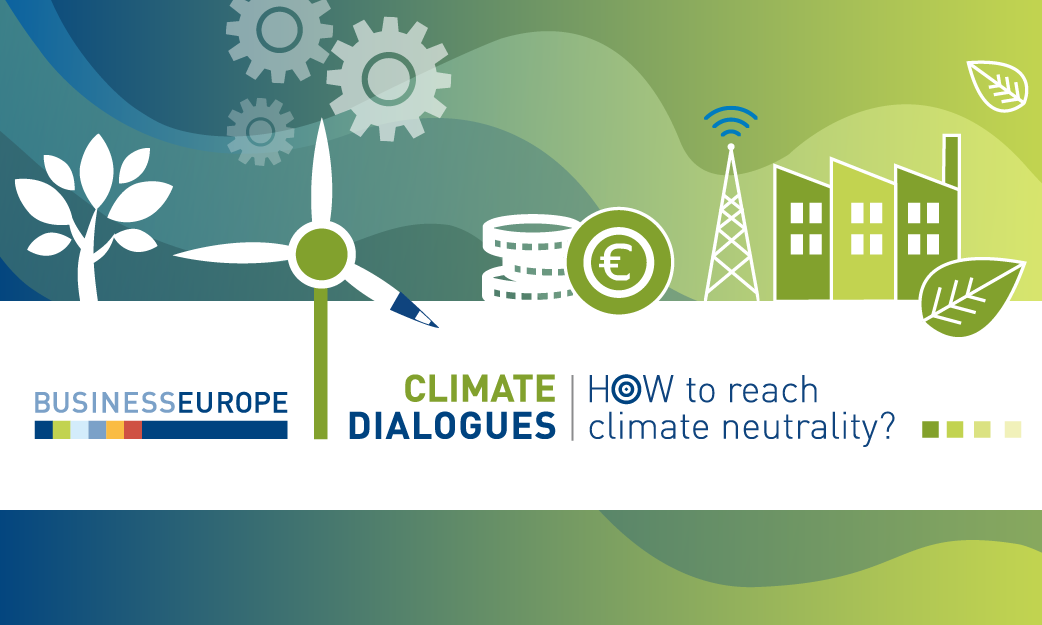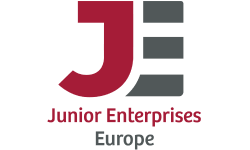BusinessEurope Headlines No. 2021-06
President Gattaz discusses green transition at EU Industry Days

"Industry is at the core of the green transition. By creating a policy framework to support and develop the European market for green tech, our companies can conquer a substantial piece of the growing global market and boost EU exports. At the same time, we should be mindful that global competition will be fierce", said Pierre Gattaz, BusinessEurope President, at the EU Industry Days plenary debate 'Green = growth, or how European companies can champion green transition'. For this to happen, President Gattaz stressed that "we need a business-friendly environment, where companies can take risks, bring innovative solutions to the market and get return on investments. What we need is a marketplace of 'green' ideas. Policy-makers must be extremely vigilant to avoid that too much burden is put on companies that are deeply affected by an unprecedented crisis. Rigid, prescriptive and intrusive new norms, legal requirements or taxes should really be minimised."
Contact: Alexandre Affre
Our comment:
Inventing 'FFP27' mask and other Single Market concerns
By Martynas Barysas, Director, Internal Market Department
 Europe’s business environment with the Single Market at its core is key for businesses to deliver what all Europeans need, be it the green and digital transition to everyone’s household, or goods and services indispensable in the face of the current Covid-19 crisis. If Europe wants to maintain the global leadership, enabling businesses to meet such societal needs should be an inseparable part of any policy decision today. Unfortunately, BusinessEurope and its members have been observing a number of worrying signs that this is not the case.
Europe’s business environment with the Single Market at its core is key for businesses to deliver what all Europeans need, be it the green and digital transition to everyone’s household, or goods and services indispensable in the face of the current Covid-19 crisis. If Europe wants to maintain the global leadership, enabling businesses to meet such societal needs should be an inseparable part of any policy decision today. Unfortunately, BusinessEurope and its members have been observing a number of worrying signs that this is not the case.
Take a look at one of the tools enabling businesses to bring to the market the products that are safe and compliant with EU rules - harmonised European standards. In the area of Single Market for goods, we witness how the European Commission is struggling to take over the role and knowledge of industry engineers and R&D units in the process of development of harmonised standards. This process should stay stakeholder-driven exactly for the reason that no bureaucracy, in a good sense of the word, can be capable of addressing the nitty-gritties of technical solutions (see the joint letter of 18 European Business organisations). This issue coupled with the challenges in the conformity assessment infrastructure and underperformance of the EU market surveillance system, may be putting into question the credibility of the EU regulatory demands as a matter of principle and risking certain 'de-harmonisation' of the Single Market. This Commission’s intrusive practice in harmonised standardisation may bring us further from the big European policy objectives and the EU global leadership, rather than closer to them.
The Single Market for services in the EU has always been another ‘hot potato’ in policy debates. It represents over 70% of the EU GDP and roughly the same level of the EU employment, services provide for around 27% of the value added within the EU manufacturing sector but now this policy area seems to be poorly attended. The EU first fails in properly preparing and then agreeing the larger part of the "2017 Services Package" of the Commission, now the Commission forgets its duty to table an analysis on regulatory barriers falling under the Services Directive by the time prescribed by the EU law (the analysis of the Services Directive implementation was due by 28 December 2020, see Article 41 of this legal act). It is not about blaming the sides, it is about fixing the hurdles in the free movement of services when the industry has a growing feeling that it has been neglected. It is why BusinessEurope, together with our partners EUROCHAMBRES and Eurocommerce, wrote the letter to the European Commission, gently reminding of its legal obligations under the Services Directive and urging to use every opportunity to have a thorough debate on Single Market for services. The above mentioned analysis is an opportunity to renew the debate on proportionality, necessity and non-discrimination of rules imposed on service providers in Member States and largely deciding the business environment.
Next comes a 'cooled potato': better regulation. It has become cool as this Commission has been keeping it on the plate without serving it way too long. Having announced some new, refreshing but still raw ideas, as the “1in-1out” principle in the mission letters to the new Commissioners, the Commission delayed the publication of its policy framework on better regulation for a number of times. The good news, the Fit-for-Future Platform did become operational, albeit no overall framework is published to date. However, the business community and, we believe, other stakeholders still struggle to understand how this Commission sees the EU regulatory processes and better regulation eco-system overall. Many of the elements of better regulation to be addressed in the delayed communication, like the approach to regulatory burdens, impact assessments, transparency of legislative processes, public consultations with stakeholders, are about enabling the lawmakers and stakeholders together to deliver on the green and digital objectives without fragmented understanding and interpretations.
And finally, on restrictions at the internal EU borders and proportionality, as Member States struggle to control the Covid-19 pandemic. We are running the risk of repeating mistakes of spring 2020 when disproportionate and uncoordinated, unilateral restrictions within the EU brought a lot of damage to the economy and society but did not stop the virus. Proportionality of measures and concerted action still remain a problem in the EU. Instead of having a forceful coordination, Member States are again diving into isolated unilateral decisions that end in multiple layers of restrictions in the EU which also change multiple times in a short period of time. It both complicates the crisis management and damages the economy that needs health too. Twenty-seven approaches to protecting people, if not more given the competences of the regions in some Member States, may look like inventing a new type of a protective mask that could be labelled ‘FFP 27’, when in reality FFP 3 provides sufficient protection and is available. Enabling businesses becomes difficult with ‘FFP 27’.
We expect today’s EU Competitiveness Council addresses at least some of these issues, as we urged it to do so in our key messages to the ministers.
Join our Climate Dialogues!
 This week we have kicked off our BusinessEurope initiative "Climate dialogues: HOW to reach climate neutrality?". It aims at discussing the major 'HOW questions' to develop solutions with politicians, citizens, non-governmental organisations, scientists, the industry, and any interested person. We want to foster our dialogue with you, all key stakeholders in Brussels, European capitals and worldwide, on moving our economies towards climate neutrality. We are engaging with all our national member federations across Europe to make this campaign happen. A series of meetings, webinars and discussions will be launched soon, stay tuned here.
This week we have kicked off our BusinessEurope initiative "Climate dialogues: HOW to reach climate neutrality?". It aims at discussing the major 'HOW questions' to develop solutions with politicians, citizens, non-governmental organisations, scientists, the industry, and any interested person. We want to foster our dialogue with you, all key stakeholders in Brussels, European capitals and worldwide, on moving our economies towards climate neutrality. We are engaging with all our national member federations across Europe to make this campaign happen. A series of meetings, webinars and discussions will be launched soon, stay tuned here.
Contact: Alexandre Affre
Informal EPSCO: Employment, skills and cohesion - the right social priorities to pass the wave of COVID-19 crisis
 The Portuguese Presidency has rightly identified employment, skills and cohesion as the key social priorities in the coming years. These are the key issues on which to focus our efforts, together as policy-makers and social partners. To be successful, we need to prioritise efforts to improve effectiveness and responsiveness of active labour market policies. We need to invest in skills training that really meet labour market needs. We need to improve cohesion by focusing social protection resources to contain unemployment and reduce inactivity levels in our societies. The recovery and resilience national plans need to be designed in a way that integrates Europe’s social partnership culture. They will also need to be implemented through a more forceful coordination of structural national labour market reforms than in the past. The way forward is to achieve a reform partnership that makes us stronger, more productive and more resilient, not an unrealistic harmonisation agenda that divides Member States and social partners. These were the main messages of BusinessEurope Director General Markus J. Beyrer at the informal meeting of Employment and Social Affairs Council (EPSCO) that was held on 22 February.
The Portuguese Presidency has rightly identified employment, skills and cohesion as the key social priorities in the coming years. These are the key issues on which to focus our efforts, together as policy-makers and social partners. To be successful, we need to prioritise efforts to improve effectiveness and responsiveness of active labour market policies. We need to invest in skills training that really meet labour market needs. We need to improve cohesion by focusing social protection resources to contain unemployment and reduce inactivity levels in our societies. The recovery and resilience national plans need to be designed in a way that integrates Europe’s social partnership culture. They will also need to be implemented through a more forceful coordination of structural national labour market reforms than in the past. The way forward is to achieve a reform partnership that makes us stronger, more productive and more resilient, not an unrealistic harmonisation agenda that divides Member States and social partners. These were the main messages of BusinessEurope Director General Markus J. Beyrer at the informal meeting of Employment and Social Affairs Council (EPSCO) that was held on 22 February.
Contact: Maxime Cerutti
Companies call for proportionality, clarity and flexibility in Taxonomy disclosure
 BusinessEurope published its position paper on reporting requirements for corporates under the Taxonomy Regulation on 23 February. The Taxonomy is not only a tool for measuring environmental performance of companies’ economic activities, but it also sets disclosure requirements for companies to explain to what extent their activities are Taxonomy-aligned. Ahead of the publication of the future Taxonomy’s reporting rules, BusinessEurope’s paper summarises companies’ questions and concerns in respect of their reporting exercises under the Taxonomy Regulation. Our paper calls for future reporting rules to be clear and proportionate with the Taxonomy’s objectives, whilst allowing for a sufficient level of flexibility to enable issuers to produce relevant information.
BusinessEurope published its position paper on reporting requirements for corporates under the Taxonomy Regulation on 23 February. The Taxonomy is not only a tool for measuring environmental performance of companies’ economic activities, but it also sets disclosure requirements for companies to explain to what extent their activities are Taxonomy-aligned. Ahead of the publication of the future Taxonomy’s reporting rules, BusinessEurope’s paper summarises companies’ questions and concerns in respect of their reporting exercises under the Taxonomy Regulation. Our paper calls for future reporting rules to be clear and proportionate with the Taxonomy’s objectives, whilst allowing for a sufficient level of flexibility to enable issuers to produce relevant information.
![]() Contact: Carolina Vigo
Contact: Carolina Vigo
The Comprehensive Agreement on Investment will rebalance the EU-China relationship
 "The Comprehensive Agreement on Investment (CAI) aims to rebalance our bilateral relationship through improved market access in China, a more level playing field and sustainable development commitments", said Maurice Fermont, Senior Trade Adviser at BusinessEurope at a webinar of the Italy-ASEAN Association on 24 February. The webinar was organised to discuss the effects and opportunities of the Regional Comprehensive Economic Partnership (RCEP) and the CAI for the Italian and European businesses. "While our wish list is not entirely empty now, our preliminary view is that we are positive about the CAI because it delivers some real improvements in key areas from the status quo", Fermont continued. The agreement’s institutional provisions ensure that there is adequate follow up on the implementation at the level of Vice Premier in China and Executive Vice-President of the European Commission. "CAI should not be seen merely as a standalone agreement, but also as one step in a broader China strategy that aims to rebalance our economic relationship. For example, additional transparency on subsidies in China will be helpful for tackling distortive subsidies in the European market", Fermont concluded.
"The Comprehensive Agreement on Investment (CAI) aims to rebalance our bilateral relationship through improved market access in China, a more level playing field and sustainable development commitments", said Maurice Fermont, Senior Trade Adviser at BusinessEurope at a webinar of the Italy-ASEAN Association on 24 February. The webinar was organised to discuss the effects and opportunities of the Regional Comprehensive Economic Partnership (RCEP) and the CAI for the Italian and European businesses. "While our wish list is not entirely empty now, our preliminary view is that we are positive about the CAI because it delivers some real improvements in key areas from the status quo", Fermont continued. The agreement’s institutional provisions ensure that there is adequate follow up on the implementation at the level of Vice Premier in China and Executive Vice-President of the European Commission. "CAI should not be seen merely as a standalone agreement, but also as one step in a broader China strategy that aims to rebalance our economic relationship. For example, additional transparency on subsidies in China will be helpful for tackling distortive subsidies in the European market", Fermont concluded.
Contact: Maurice Fermont
Recovery and Resilience Facility must be implemented swiftly and support projects that will boost growth and competitiveness
 The Recovery and Resilience Facility instrument must be implemented swiftly, and Member States' Recovery and Resilience plans must support investment and reforms that can help transform EU growth, productivity and competitiveness. That was the key message from BusinessEurope at the 14th meeting of the European Semester Group at the European Economic and Social Committee on 18 February, where Senior Advisor Malthe Munkøe had been invited to present business priorities and recommendations on the implementation of the Recovery and Resilience Facility. "In this context it is important that attention is directed at the quality of the spending and what long-term economic advantages investments and reforms will unlock", he noted.
The Recovery and Resilience Facility instrument must be implemented swiftly, and Member States' Recovery and Resilience plans must support investment and reforms that can help transform EU growth, productivity and competitiveness. That was the key message from BusinessEurope at the 14th meeting of the European Semester Group at the European Economic and Social Committee on 18 February, where Senior Advisor Malthe Munkøe had been invited to present business priorities and recommendations on the implementation of the Recovery and Resilience Facility. "In this context it is important that attention is directed at the quality of the spending and what long-term economic advantages investments and reforms will unlock", he noted.
Contact: Malthe Munkøe
An Industrial Emissions Directive fit for purpose
 "Our priority in moving forward will be to preserve the key principles of the directive: the Best Available Techniques focus, the integrated approach and the Sevilla process", said BusinessEurope Environment and Energy Adviser Cecilia Serrano-Piedecasas. On 19 February, BusinessEurope joined its Irish member Ibec’s Environment Policy Committee for an update on the Industrial Emissions Directive (IED) revision. The discussion focused on the key issues industry is facing ahead of the new proposal expected for the end of the year. The IED is one of the most important pieces of legislation for industry, regulating activity for over 50,000 plants in Europe. Serrano-Piedecasas highlighted that any changes to the directive should avoid inconsistencies or overlaps with other existing legislation regulating the environmental performance of a plant. BusinessEurope is currently in the process of developing its position and will be contributing to the ongoing consultation process.
"Our priority in moving forward will be to preserve the key principles of the directive: the Best Available Techniques focus, the integrated approach and the Sevilla process", said BusinessEurope Environment and Energy Adviser Cecilia Serrano-Piedecasas. On 19 February, BusinessEurope joined its Irish member Ibec’s Environment Policy Committee for an update on the Industrial Emissions Directive (IED) revision. The discussion focused on the key issues industry is facing ahead of the new proposal expected for the end of the year. The IED is one of the most important pieces of legislation for industry, regulating activity for over 50,000 plants in Europe. Serrano-Piedecasas highlighted that any changes to the directive should avoid inconsistencies or overlaps with other existing legislation regulating the environmental performance of a plant. BusinessEurope is currently in the process of developing its position and will be contributing to the ongoing consultation process.
Contact: Cecilia Serrano-Piedecasas
BusinessEurope supports Junior Enterprises Europe
 "Recognising the value of the Junior Enterprise concept means acknowledging an excellent tool to develop entrepreneurial skills", said BusinessEurope Senior Adviser Daniele Olivieri during the opening ceremony of the annual Junior Enterprise Europe Winter Conference, held virtually on 24 February. During his keynote, Olivieri outlined BusinessEurope's priority policy areas, stressing in particular that it is crucial to support SMEs in the twin green and digital transition and to restore freedoms of movement in the Single Market to pre-COVID conditions as soon as possible. During the event, BusinessEurope participated in the excellence awards jury who selected the best Junior Enterprises of 2020 across different categories.
"Recognising the value of the Junior Enterprise concept means acknowledging an excellent tool to develop entrepreneurial skills", said BusinessEurope Senior Adviser Daniele Olivieri during the opening ceremony of the annual Junior Enterprise Europe Winter Conference, held virtually on 24 February. During his keynote, Olivieri outlined BusinessEurope's priority policy areas, stressing in particular that it is crucial to support SMEs in the twin green and digital transition and to restore freedoms of movement in the Single Market to pre-COVID conditions as soon as possible. During the event, BusinessEurope participated in the excellence awards jury who selected the best Junior Enterprises of 2020 across different categories.
Contact: Daniele Olivieri
Calendar 
- 1-2 March: FEDIL Industry Days 2021
- 1-3 March: Europe-Iran Business Forum
- 1-5 March: Civil Society Days 2021
Not yet a subscriber? Register here.
Reminder: please have a look at our privacy policy